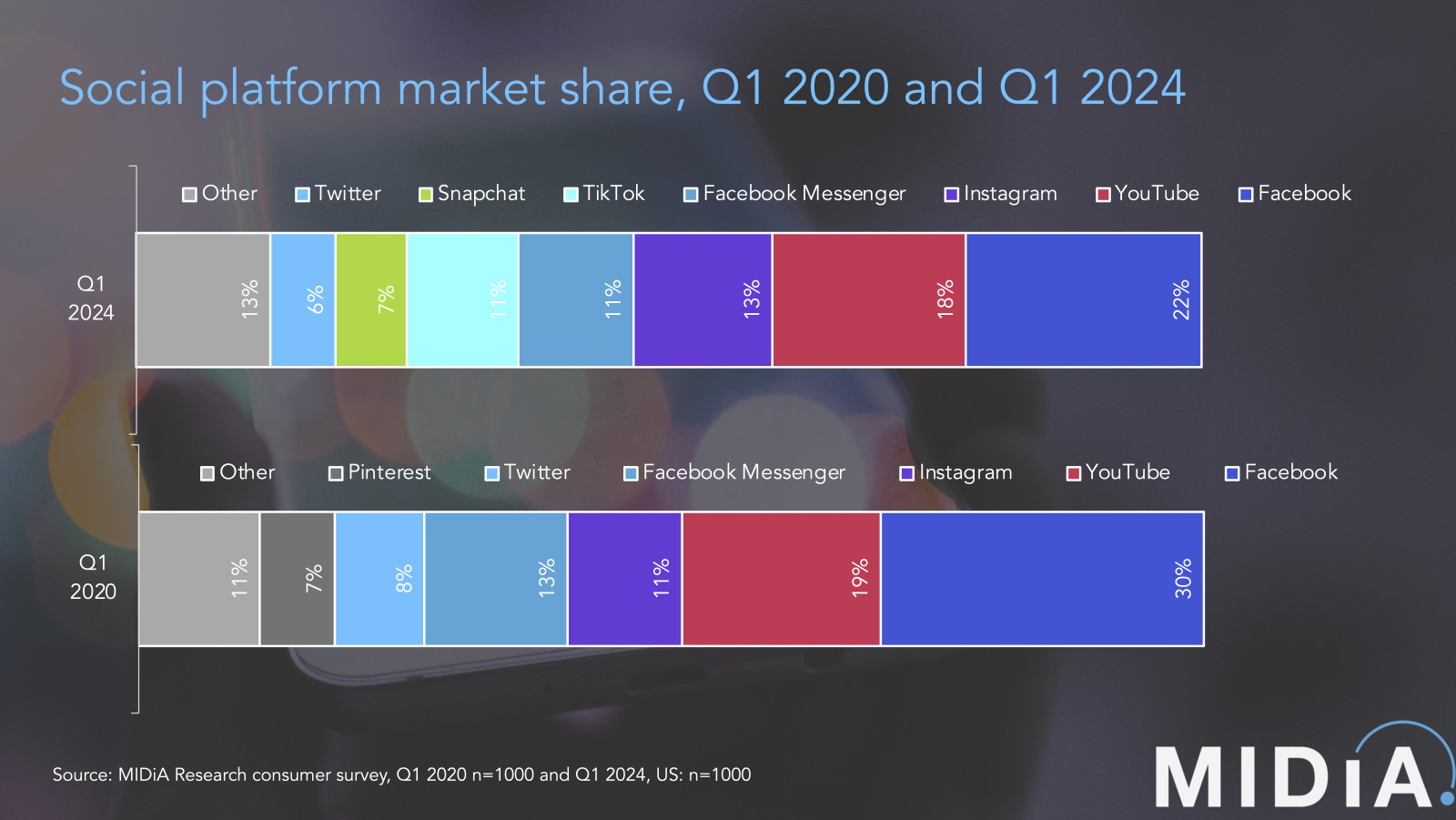Social companies face a fragmenting digital ecosystem


On the surface, it is a year of opportunity for social platforms. TikTok may face a ban in the US, opening market share for Reels, Shorts, and any other platform with social video features to sweep in and snap up any remaining free consumer time. Reddit has IPO’d, with its stock rising 4% after releasing its first quarterly earnings report. The creator economy, underpinned by audiences that are increasingly turning to creativity as the most active form of engagement, and the boom of generative and assistive AI tools at the fingertips of anyone who can post online, are set to make their homes on social apps. The platforms can benefit on two fronts: one, the increased engagement and content available on their platforms, and two, the resulting dilution of impact of any one creator, which keeps audiences ‘platform loyal’ rather than ‘creator loyal’ and thus increases their value.
Yet beneath the surface, a bigger trend is emerging. While social as a whole is booming, the biggest players’ dominance is reducing, with no one platform the beneficiary. Simply put, the marketplace is mature and beginning to fragment, with no single winner coming out on top. Perhaps the most obvious example played out with the restructuring of Twitter into X. The app lost some cultural clout following the transition, with some users splitting off to apps like BlueSky, Mastodon, and Threads. Ultimately, however, no one app picked up the slack, and X’s weekly active userbase did not decrease by much. Attention fragmented across more apps, while user numbers stayed stable on the surface.
Part of this phenomenon is that competing with like-for-like features does not seem to be a competition at all; users are happy to stack apps, even if they share technical functionality. While Reels and Shorts may position themselves as direct competitors to TikTok, the overlap in usage is incredibly high, with nearly half the audience on each platform also using the others (source: MIDiA Research Consumer Survey, Q4 2023). Rather than features being the distinguishing point, unique on-app cultures – the ephemeral combination of user network, the content-driven information context (a.k.a. whether the app serves them cat memes, news articles, or fanfiction), and engagement habits (whether you’re more likely to live in the DMs, comments section, or post feed) – drives the real differences.
Featured Report
The future of (US) TikTok Implications for the social marketplace
TikTok has played a significant role in digital culture over the last five years, driven largely by pandemic-era adoption and knock-on effects. From marketing strategies to viral trends, it has become inextricable from Gen Z culture. Yet it now faces risk of disruption in the US and possibly beyond as a result.
Find out more…
There are other factors at play here; a maturing marketplace, strategic directions, and digital fatigue (more than two-thirds of consumers have attempted to reduce their screen time in the last month, with nearly a third deleting apps in their efforts to do so). We dive into the full picture in our upcoming report, “Death of the Town Square | Social fragmentation is creating a decentralised digital future”: subscribe to our newsletter to be notified when it is published.
The big takeaway, however, is that amid the flood of content and creativity, and the fragmentation across services, we are losing any semblance of digital common ground. A decentralised pre-2000’s internet was ‘civilised’ by platforms that everyone could be on and engage with, creating the ‘town squares’ of the internet. Now, not only is the market fragmenting overall, but precision algorithms are creating tiny filter bubbles within apps, fragmenting their audiences internally as well as externally. While this is not inherently threatening to the apps themselves (after all, as long as users remain, all appears well), it does reduce the cultural ‘gravity’ granted by collective participation. If your community on an app of millions shrinks to a filter bubble of ten, it does not really matter which app you are on.
There is a year of potential ahead – but with layoffs, strategic shifts, audience fragmentation, digital fatigue, and the symptoms of innovative stagnation, perhaps a year of disruption, too.
If you want to learn more about MIDiA’s social coverage or upcoming report on digital fragmentation, you can subscribe to our newsletter or email us at info@midiaresearch.com.

The discussion around this post has not yet got started, be the first to add an opinion.